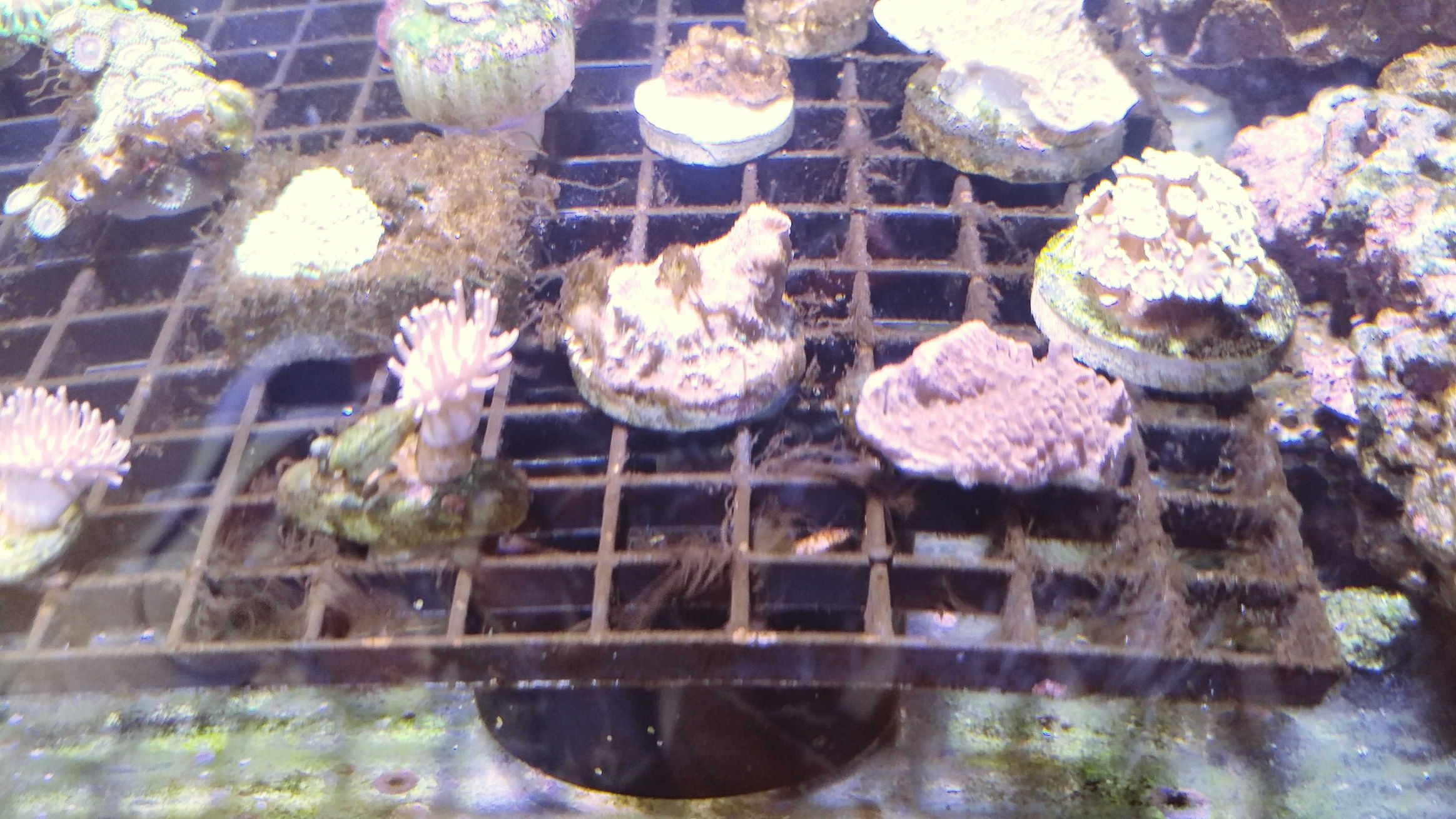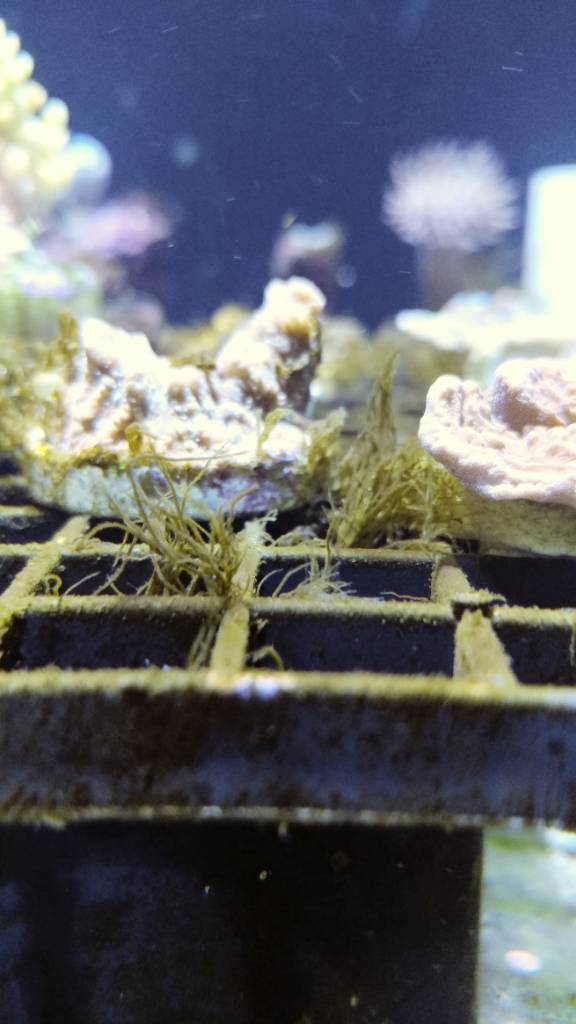Navigation
Install the app
How to install the app on iOS
Follow along with the video below to see how to install our site as a web app on your home screen.
Note: This feature may not be available in some browsers.
More options
You are using an out of date browser. It may not display this or other websites correctly.
You should upgrade or use an alternative browser.
You should upgrade or use an alternative browser.
Algae removal
- Thread starter BrandonM
- Start date
- Tagged users None
- Joined
- Nov 16, 2015
- Messages
- 303
- Reaction score
- 197
Will Fluconazole help get rid of this stuff? Not sure the correct name for it.

I read that it does well for green hair algae just don’t have the guts to dump it in my mixed Reef with numerous wrasses etc
I would try husbandry first.
Can you post your water parameters, including nitrate and phosphate?
How old is this tank?
Is it a bare system (e.g. frag tank) or is it a functional reef with live rock, etc?
Also what filtration or nutrient export methods are you using?
Do you have a CUC? If so, what and how many?
Can you post your water parameters, including nitrate and phosphate?
How old is this tank?
Is it a bare system (e.g. frag tank) or is it a functional reef with live rock, etc?
Also what filtration or nutrient export methods are you using?
Do you have a CUC? If so, what and how many?
What is this stuff in the picture ?
You'll need to get a better photo at minimum. If you can get a nice closeup pic with your phone (all pumps off!) or even put a sample under a microscope ($10...doesn't have to be a fancy one) it would help a lot.
- Joined
- Dec 30, 2016
- Messages
- 200
- Reaction score
- 73
Water parameters are
Ammonia 0
Nitrite0
Nitrate10
Ph8.1
Phosphate .25
Calc480
Kh9
I manually remove it and it come back fast. Ita a 20 gallon frag tank, been up about 6 months bare bottom 10 pounds of live rock. Xport no3 plate
Ammonia 0
Nitrite0
Nitrate10
Ph8.1
Phosphate .25
Calc480
Kh9
I manually remove it and it come back fast. Ita a 20 gallon frag tank, been up about 6 months bare bottom 10 pounds of live rock. Xport no3 plate
My guess is that you have a co-bloom of some filamentous algae along with something like diatoms growing as epiphytes. It's common.
Probably too much light and too many nutrients into too new of a tank....nothing but space for algae to grow and ideal conditions for it. (I.e. immature tank)
Egg crate is too hard to clean too...you might consider switching to something easier.
Looks like your nutrient numbers have not crashed yet (good!), so I'd remove this plate. Keep numbers where they are, or let them fall naturally. Depend on your live rock.
No other filtration or media at work?
Can you also turn down the lights a little? Before you do, any idea what the current #lux or PAR levels are like?
It seems like what you're missing is a solid cleanup crew. Any change you have an herbivore fish in a larger tank nearby that you could "borrow"? Otherwise just get plenty of snails.
Probably too much light and too many nutrients into too new of a tank....nothing but space for algae to grow and ideal conditions for it. (I.e. immature tank)
Egg crate is too hard to clean too...you might consider switching to something easier.
no3 plate
Looks like your nutrient numbers have not crashed yet (good!), so I'd remove this plate. Keep numbers where they are, or let them fall naturally. Depend on your live rock.
No other filtration or media at work?
Can you also turn down the lights a little? Before you do, any idea what the current #lux or PAR levels are like?
It seems like what you're missing is a solid cleanup crew. Any change you have an herbivore fish in a larger tank nearby that you could "borrow"? Otherwise just get plenty of snails.
Will Fluconazole help get rid of this stuff?
Yes, Fluconazole can help cleanse these algae.
Fluconazole works well in green and brown algae but not in all, only those that have ergosterol (or perhaps other C29 lipids, but this has not yet been confirmed), as structural lipid on their walls. It also seems to help in the development of soft corals, perhaps by interfering with the fungi on their surfaces. In the experiments so far, it appears to be very safe for animals in general at the recommended doses.
Best regards
There are not many studies on this, especially when under conditions of eutrophication, as is customary in reef tanks. Most of these are anecdotal observations that may be useful as to the direction to take, but they do not explain what happens, as in almost everything in the hobby.@Jose Mayo Wondering if you've looked into the symbiotic role of fungus within the coral microbial community much yet?
Best regards
It seems from some studies that they think fungi are useful to the coral's holobiont like many of the other microbes found there, including the Symbiodinium dinoflagellates we all know so well. This seems contrary to what I've heard before around here that there are no fungi to worry about....so I wondered about that dichotomy.
There is no dichotomy. Fungi may be useful to the holobionts when in equilibrium, and usually in natural conditions they will be in balance, but in a reef tank there will be everything except "natural conditions", so the relationships that are imposed may not be what one would like. There are several reports of apparent "improvement" of soft corals following administration of Fluconazole, I suppose it is because of their interference on the surface fungi, but I have no proof of this.It seems from some studies that they think fungi are useful to the coral's holobiont like many of the other microbes found there, including the Symbiodinium dinoflagellates we all know so well. This seems contrary to what I've heard before around here that there are no fungi to worry about....so I wondered about that dichotomy.
@mcarroll Something about it: Fungal association with sessile marine invertebrates
This paper, although very briefly, discusses the possibility that, under conditions of environmental change, even fungi supposedly "beneficial" to holobiont coral, may become pathogenic if opportunity allows.
Best Regards
This paper, although very briefly, discusses the possibility that, under conditions of environmental change, even fungi supposedly "beneficial" to holobiont coral, may become pathogenic if opportunity allows.
Best Regards
Last edited:
There is no dichotomy. Fungi may be useful to the holobionts when in equilibrium, and usually in natural conditions they will be in balance, but in a reef tank there will be everything except "natural conditions", so the relationships that are imposed may not be what one would like. There are several reports of apparent "improvement" of soft corals following administration of Fluconazole, I suppose it is because of their interference on the surface fungi, but I have no proof of this.
Tanks that are run with normal (limited) organic carbon levels as well as normal (replete) nutrient levels seem to have healthy corals and demonstrate somewhat natural conditions. The only major thing we seem to lack is spawning behavior.
To your point, it does seem like a lot of "modern" tanks are run in a perpetually destabilized/unnatural state:
...where everything starts off "sterile" instead of with live rock
...where carbon levels are persistently elevated
...where nutrient levels are persistently taken to the lowest low that can be achieved (often zero)
...and, generally speaking, where every hack that can conceivably be used is used.
Very often this is all from the very first day the tank is set up...and often seems to be done out of fear or worry vs need. Lots of folks seem to be going through this bitter cycle.
I'm hoping we see a return to something closer to the nice, simple "Berlin Method" style of reefing! (That's still how the best reefs are built...but seems like we're getting further from starting and running tanks that way all the time.)
even fungi supposedly "beneficial" to holobiont coral, may become pathogenic if opportunity allows.
Good link...will have to read the whole thing when I've got a bigger block of time.....used mine up writing this!
Try this one: Microbes in the coral holobiont: partners through evolution, development, and ecological interactions
This one barely gets more specific than "microbes" but is also really interesting (along with the microbialization link below): Coral-associated micro-organisms and their roles in promoting coral health and thwarting diseases
That's surely due to "microbialization" IMO (tell me what you think).....which is not random chance, but a specific sets of conditions that seems to be anchored by elevated organic carbon levels. Not easy to prevent in the ocean where you're facing obstacles ranging from natural forces to real estate developers. Thankfully prevention/avoidance rests on a simple set of choices for the home reefer. I think those choices could be summarized fairly as: aim for stability and avoid hacks. That approach can make everything from algae blooms to disease outbreaks less likely to happen and less severe when they do.
Without wishing to prolong the discussion to the point of once again "sequestering" the topic ...That's surely due to "microbialization" IMO (tell me what you think)
I would say yes, especially "microbialization" (or abnormal and accentuated development of the microbial context of the holobionte) can have profoundly negative implications on coral development, not only because of the carbon increase, but also because of the response to a context such as very high alkalinity and conditions of low circulation in a context that is poor in inorganic nutrients and excessive lighting (situations very common in aquarism), that can promote the thickening of mucus and low oxygenation of the coral, which in itself would already affect the their immunity and their defense responses to the pathogenic or potentially pathogenic microbes present in their microbiota.
I think so, you could open a specific topic for this and there we would discuss among all the various hypothetical situations in which our eternal quest for more growth and more colors in our ultra-high-tech systems leads us to produce, rather than great results, great imbalances.
Best Regards
Last edited:
Similar threads
- Replies
- 1
- Views
- 85
- Replies
- 1
- Views
- 153
- Replies
- 19
- Views
- 507
- Replies
- 5
- Views
- 136


















